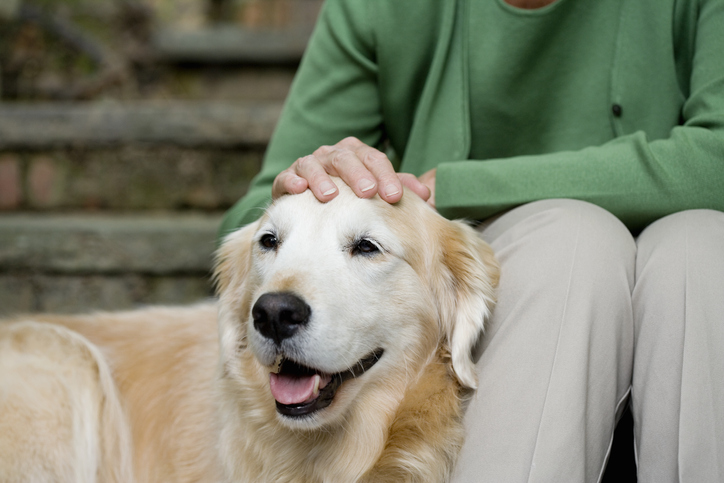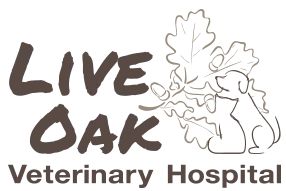Wouldn’t it be great if our dogs could live forever? Sadly, like us, dogs age! It is hard to understand when they are considered a ‘senior,’ though. There is no magic number that determines when a dog is suddenly old. However, there are signs that you can watch out for that tell you your dog is aging.

White Hairs Around the Face
Have you noticed any white hairs around your dog’s face lately? As all dogs age, their bodies begin slowing down. One of the first signs is white hairs surrounding their face. It may start off as a few strands near their noses or eyes and continue spreading with time.
As a dog ages, their hair and skin stop producing the vivid colors of their coat, which is why the hair that grows is white. It is also common to see white hair on a dog’s belly, paws, and back. Don’t worry though, this lack of coat color does not hurt or indicate that there is a worsening problem! It is simply just a part of aging.
Forgetfulness and Whining
Some dogs will start to develop a condition called Canine Cognitive Dysfunction, which is similar to Alzheimer’s or Dementia. Sadly, this is also a normal part of aging. If your dog has this condition, they may start to forget where important things are in their own home, as their food bowl. Other dogs whine in familiar places as they start to forget smells.
There is no cure for this health condition. However, you can prolong it. To slow down the progression, you can provide your senior pup with mentally stimulating toys, puzzles, and games. For instance, you can create a maze around your home that they need to follow. This not only strengthens your dog’s physical body but their mind as they have to make decisions.
Slower Movements
It is also common to see dogs slowdown in their movements as they get older. This is especially common in dogs with short or long legs and disproportionate hips. When dogs like Poodles and Dalmatians age, they develop joint health problems like Arthritis and Hip Dysplasia.
These joint health conditions cause pain to their legs, joints, and back. If the pain is too severe, your dog may stop walking or walk with a slight limp. Sometimes, you can physically see your dog’s joints swell with inflammation.
There are medications your dog’s veterinarian can prescribe to solve this issue. You can also try to prevent joint problems by providing your dog with supplements to help build cartilage. The most popularly consumed supplement for joint pain is Omega 3 Fatty Acids.
Hearing Loss
Do you call your dog, and he doesn’t come to you? Your dog may not be responding because they can’t hear you. While it is possible for your dog’s body to repair any damage or trauma to the eardrum, as your dog ages, it becomes more difficult. Once your dog loses their hearing as an old senior dog, it is difficult to regain it back.
Hearing loss in old senior dogs is not the end of the world, though. You can still provide your furry friend with a happy and active life. The only thing is, there are chances that you need to make to your dog’s lifestyle. For instance, instead of communicating with your voice, you can flash different lights and train your dog to understand movements.
Some dogs interestingly learn American Sign Language, and while they cannot respond the same way, they do understand the commands their humans are directing to them.

Cataracts and Loss of Eyesight
Older dogs also start to develop cataracts with age. Cataracts are cloudy eyes that engulf your dog’s vision. They seldom worsen and only affect your dog’s eyesight. However, cataracts develop slowly, which means that your dog has time to get used to its lack of eyesight. By the time you take your dog to the vet, it may not be a problem for your dog.
You cannot cure cataracts as they can continue to come back, but there are ways to take out the cloud cataract and replace it with a clear lens. Not all dogs, however, qualify for cataracts surgery since older dogs have a higher risk of dying in surgery. Instead, you can make your dog comfortable.
Even without their eyesight, dogs still need exercise and playtime. You should invest in toys that play music or stimulate your senior dog’s other senses like smell.
Inability to Hold in Urine or Feces
Senior dogs also suffer from the inability to control their bladders, resulting in them urinating without trying. This is especially common as dogs sleep. Since your dog’s body is starting to shut down, they lose control of the muscles. Some pet owners use dog diapers on their pets to help with the mess.
There is nothing you can do about your dog’s inability to hold in their urine or feces except to clean and take them out frequently to use the bathroom.
Conclusion
In conclusion, there is no one age for senior dogs. Since each dog breed lives different life expectancies, it is hard to determine a number. However, there are signs of aging that you can watch for in your dog. Older senior dogs, for instance, begin losing their sight, hearing, inability to hold in their pee and lose their memories.
If you would like to talk with a veterinarian about your senior dog’s care call Live Oak Veterinary Hospital at 209-432-9437 or book an appointment online!
